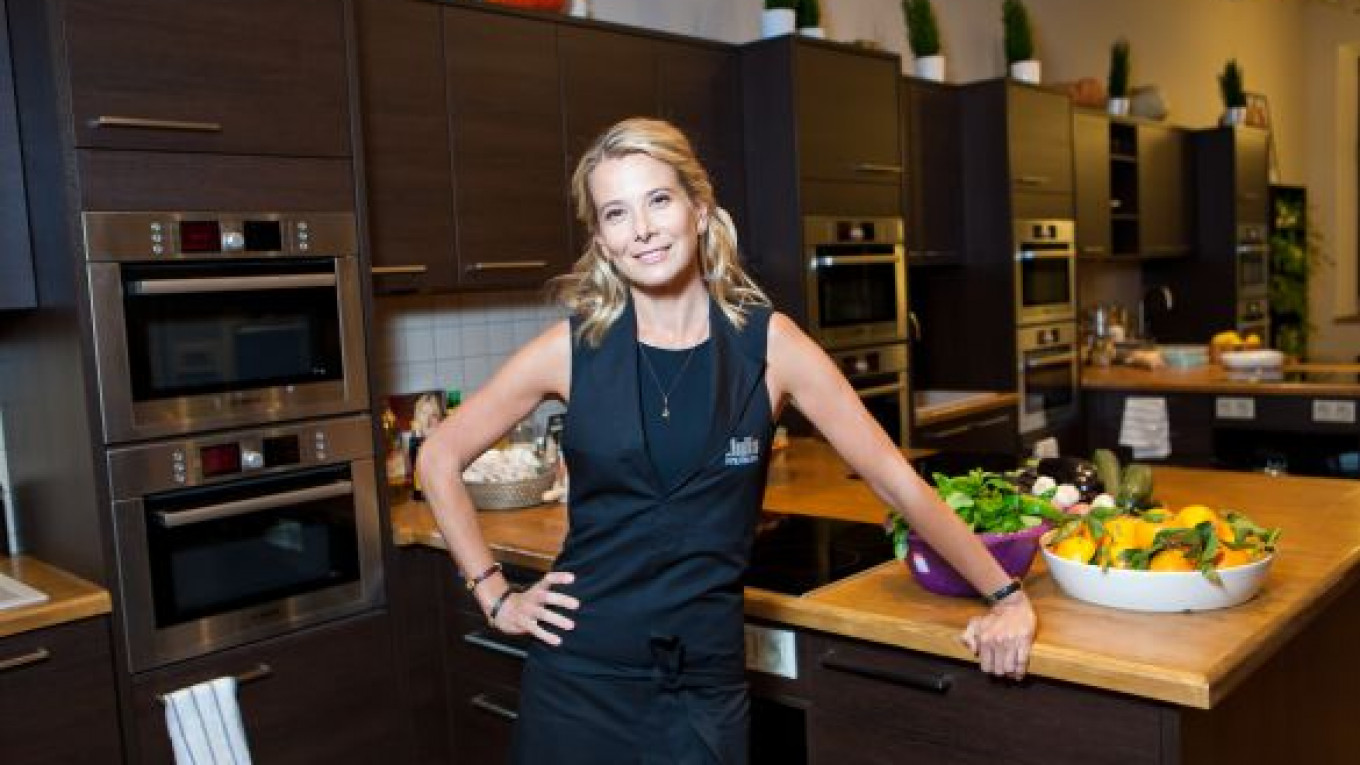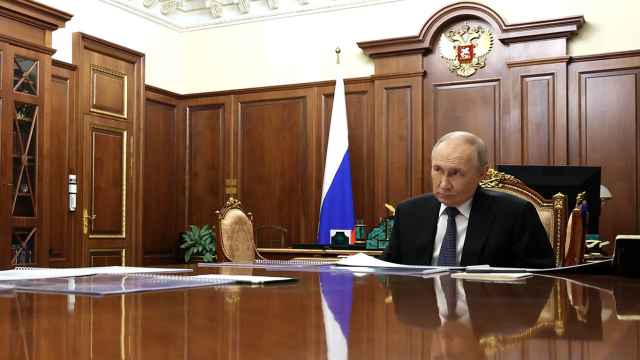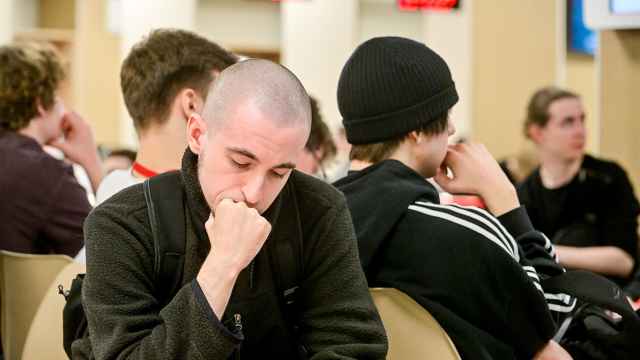People eat out in Moscow because they like the crowd, the atmosphere, the reputation of the restaurateur — almost anything but for the food. Coming from Yulia Vysotskaya, an actress and TV presenter who has recently opened a restaurant, that claim could raise an eyebrow. Vysotskaya insists that her restaurant, Yornik, a joint venture with her husband, film director Andrei Konchalovsky, is above all a place to eat.
Yornik, which translates as "the sly trickster," has a prime spot just off Tverskaya Ulitsa. This is the latest venture for Vysotskaya, whose culinary empire spans primetime TV cooking shows, master classes, recipe books, the Khleb Sol (Bread Salt) cooking magazine and the EdimDoma social network website.
Vysotskaya's TV show is watched by millions and she has published nine cook books, but the restaurant business is a tough trade. As well as the universal difficulty of finding good staff, Moscow restaurateurs face extra hurdles, from red tape to getting a decent supply of fresh produce, plus the culture of restaurant dining does not compare to other countries. The Russian capital might seem well supplied with restaurants, but in terms of numbers it hardly compares with Paris, New York or Tokyo — Moscow has one restaurant for every 3187 inhabitants, whereas there is one restaurant for every 126 Parisians and 365 New Yorkers, according to Forbes.
Nonetheless, Russians are buying into the trend for eating and preparing more adventurous food, which Vysotskaya's business is capitalizing on.
Education
1995 Belarussian State Academy of Arts
1998 London Academy of Music and Fine Arts
Work experience
Theater (includes) “The Bald Soprano” (1993), “Look Back in Anger”(1993), “The Star Without a Name” (1995), “Love is a Golden Book” (2002), “The Seagull” (2004), “Miss Julie” (2005, 2009), “Uncle Vanya” (2009-present)
Films (include) “Bewitched” (1994) “House of Fools” (2002)“The Lion in Winter” (2003), “The Nutcracker in 3D” (2010)
Culinary career
2003 — Starts presenting Let's Eat at Home for NTV
2006 — Publishes Let's Eat at Home – the first of nine recipe books
2009 — Becomes editor in chief of culinary magazine KhlebSol; starts presenting Breakfast with Yulia Vysotskaya for NTV
2011 — Opens Yornik restaurant with husband, film director Andrei Konchalovsky
Favorite authors: Henry Miller, Vladimir Mayakovsky, Anton Chekhov,
Reading now: “The Captive” (1927) by Marcel Proust
Favorite film: “Eight 1/2” (1963) directed by Federico Fellini
Restaurant: Uilliams, Malaya Bronnaya 20a
Weekend getaway: “Anywhere! It doesn't have to be London or Paris, just somewhere for a change of scenery and human relations.”
"I think that food as a hobby, as a passion is just developing. We are not bored yet," she said, adding that classes at her cooking academy are consistently sold out. And even she has been surprised by just how many people are using the edimdoma.ru site to swap recipes, share tips and upload pictures of their culinary masterpieces.
Getting into the restaurant trade was a way of extending her business, she says. Yornik picked up largely positive reviews when it opened in November, but a spokeswoman for Vysotskaya declined to reveal turnover or profits.
Her next venture, a caf?-bistro project still in want of investors, will not replicate the meticulously prepared creations served at Yornik. "I think for that you have to wait until our audience grows up," she said.
A starstruck customer hoping to find Vysotskaya in the kitchen knocking up a tarte tatin might be disappointed. "People who come attracted to my name probably won't find the kind of food I cook on the program," she says. Her style of cooking is "easy, fast, home-style cooking" with dollops of experimentation and improvisation, while the restaurant is painstakingly perfectionist and led by a trained London chef.
The only dish on the menu that is recognizably Vysotskaya's is "grechetto," a variation on risotto made with "grechka" or buckwheat porridge, her own invention that originated as a dish for her children's tea. At 560 rubles, grechetto with mushrooms and Parmesan is the cheapest entr?e. Turbot with beetroot, braised celery, bone marrow, dill cream and borsch sauce is 1570 rubles. The menu is drawn up by Vysotskaya and British head chef Daniel Phippard.
The choice of a non-Russian to cook Russian fare was deliberate. "I was looking for someone from Scandinavia or London, because I wanted a broader view on what was happening in the world," she says. "Moscow is a prosperous city, but it still lacks some knowledge in crafts."
This interview has been edited for length and clarity.
Q: Why did you decide to open a restaurant?
A: I am a working person and we have a production center — we make documentaries, we make TV programs, we do theater programs. It was part of extending the business, but it has become a very creative process. I thought I would be the face of the restaurant … and then you get involved in choosing the glasses, in designing the table, thinking about what cocktails should be on the menu, how [the menu] is written and how it is presented. So now it is my baby.
Q: What problems have you faced?
A: The same as any restaurateur in Moscow. First, the rent is very expensive. Then quality produce is very difficult to find. But now we have found some farmers that we are getting a really, really good supply from with meat, dairy and poultry. These are problems that people are facing everywhere in the world, but it is a bit more difficult in Russia because our agriculture is in such a poor state at the moment. If you want to make a dessert with British strawberries or raspberries the quality is guaranteed. Here you have to go a long way to find the products you need. … [Suppliers] come and go, some promise and a few times they don't deliver. You get let down. So what can I say, it's a struggle.
Q: How is business?
A: It's not too bad, but a bigger income is always nice. I think it takes time for people to understand the difference between [our restaurant and] a restaurant that serves you sushi, pizza, Georgian food and Russian food at the same time at the same menu. This is very common, this is Moscow cuisine. You go just across the road and you open the menu and you eat whatever you want. Any of your desires will be fulfilled, which I doubt contributes to the quality of what you are getting.
Q: Is there a contradiction in serving traditional Russian peasant food at relatively high prices — 590 rubles for a plate of pelmeni.
A: These pelmeni are a work of art! The French would say ***chef-d'oeuvre***, because they are handmade everyday. The meat we are using is prime quality meat, the sauce is created from a very good dairy product. If you see the pasta, it is almost transparent. You have to be highly professional. If you go to France and order bouillabaisse, in some places you pay 7 euros and in another place you pay 75 euros. And believe me it's a different bouillabaisse! Of course sometimes you pay for the name [of the chef] — it happens.
Q: How did you become interested in food?
A: I grew up in the south of Russia and traveled a lot with my family — Azerbaijan, Armenia, Georgia. It gave me different perspectives on food as part of family life, as part of joy in life, as opposed to what people here, in middle Russia, experience. It is a completely different cuisine, completely different weather, completely different possibilities for what to cook and how to cook it. … Here food is [seen] more in terms of survival. People ate because they had to — I am talking part of the major part of the population who were serfs, not aristocracy. The aristocracy ate French food or they brought chefs from abroad.
Q: Are you tempted to open a restaurant based around the southern-Russian/Caucasian food you grew up with?
A: We are developing a project that is more caf?-bistro style, with exactly the food I am cooking. Not like the food we prepare here because I think for that you have to wait until our audience grows up a bit.
Q: When will the bistro open?
A: We are looking for an investor. It is a big project and the rent is such that we cannot do it by ourselves. We need someone strong, who will be enthusiastic about what we are doing, so we are looking for a partner.
Q: What are the special challenges of doing business in Russia?
A: The right location is very difficult to find here. This relation between quality and price is a tough one, it is really not easy. There are many things I don't know, because I am not dealing with the bureaucracy. My employees do that. Thank God I am dealing only with creative things!
But first of all alcohol. When you get the alcohol license, you realize that you can't make money on it because the import [duty] is so huge. So this is a difficult business, it's not easy money.
Q: Who are your inspirations?
A: Believe it or not, [my interest] started when I was watching Ready, Steady Cook in London. I think British television has done a lot to change food habits for the better. You can find any cuisine in Moscow, but British food has become so interesting! British cuisine is so diverse and I think television plays quite an interesting role in creating trends.
Jamie [Oliver] — he was an inspiration when he was doing the Naked Chef [television series and books]. I love books by Nigel Slater, I think he is a fantastic writer. His books about food are about more than food, they are about life.
Q: What about Russian inspirations?
A: There are people I admire for what they are doing. I think [chef] Anatoly Komm is one of the pioneers and I think he has done great things for Russian cuisine, for creating something special and authentic. I think [Andrei] Deloss is a great restaurateur. He pays attention to detail, nothing slips his attention. But I can't say that I've been inspired by those people, because inspiration is something more than rational.
I never met the mother of my husband, but when he talks about her, he gets inspired. He knows some of her recipes and he passed them to me. That inspires me, because there was love around the table, love for food, but also love for art. I think that's what I'm trying to create at my home.
Q: Does your husband cook?
A: He can but he doesn't. He was lucky to marry me! First of all I don't like people cooking in my kitchen. I am very possessive, I like my pans, my knives, my cooker, the stove and I rarely allow people to be around in it!
Q: You have described your cooking style as домашняя кухня: What does that mean to you?
A: Cooking is very rewarding, not many people realize that. What do you do to relax? Some people go for a walk, … some go to the spa, others see friends, children. What is so interesting about food is that once you are by yourself in your own kitchen, you see the results of your work in front of you. And not only that, this result is appreciated by your family and people who come to your house, so the reward is even greater. I think it is emotionally addictive to cook. To me it is such a joy when I get together around the table with people I love and they say: 'Oh, that's really nice, it's better than in the restaurant.'
I think many people simply just don't realize how much joy preparing food can bring. And that it's cheaper to cook, especially in Moscow. … We used to say our food is boiled sausages and potatoes, and I believe it is not like that any more. Even with a busy life people go out, or buy more interesting things than sausages and potatoes, so why not go even further and experiment.
A Message from The Moscow Times:
Dear readers,
We are facing unprecedented challenges. Russia's Prosecutor General's Office has designated The Moscow Times as an "undesirable" organization, criminalizing our work and putting our staff at risk of prosecution. This follows our earlier unjust labeling as a "foreign agent."
These actions are direct attempts to silence independent journalism in Russia. The authorities claim our work "discredits the decisions of the Russian leadership." We see things differently: we strive to provide accurate, unbiased reporting on Russia.
We, the journalists of The Moscow Times, refuse to be silenced. But to continue our work, we need your help.
Your support, no matter how small, makes a world of difference. If you can, please support us monthly starting from just $2. It's quick to set up, and every contribution makes a significant impact.
By supporting The Moscow Times, you're defending open, independent journalism in the face of repression. Thank you for standing with us.
Remind me later.






